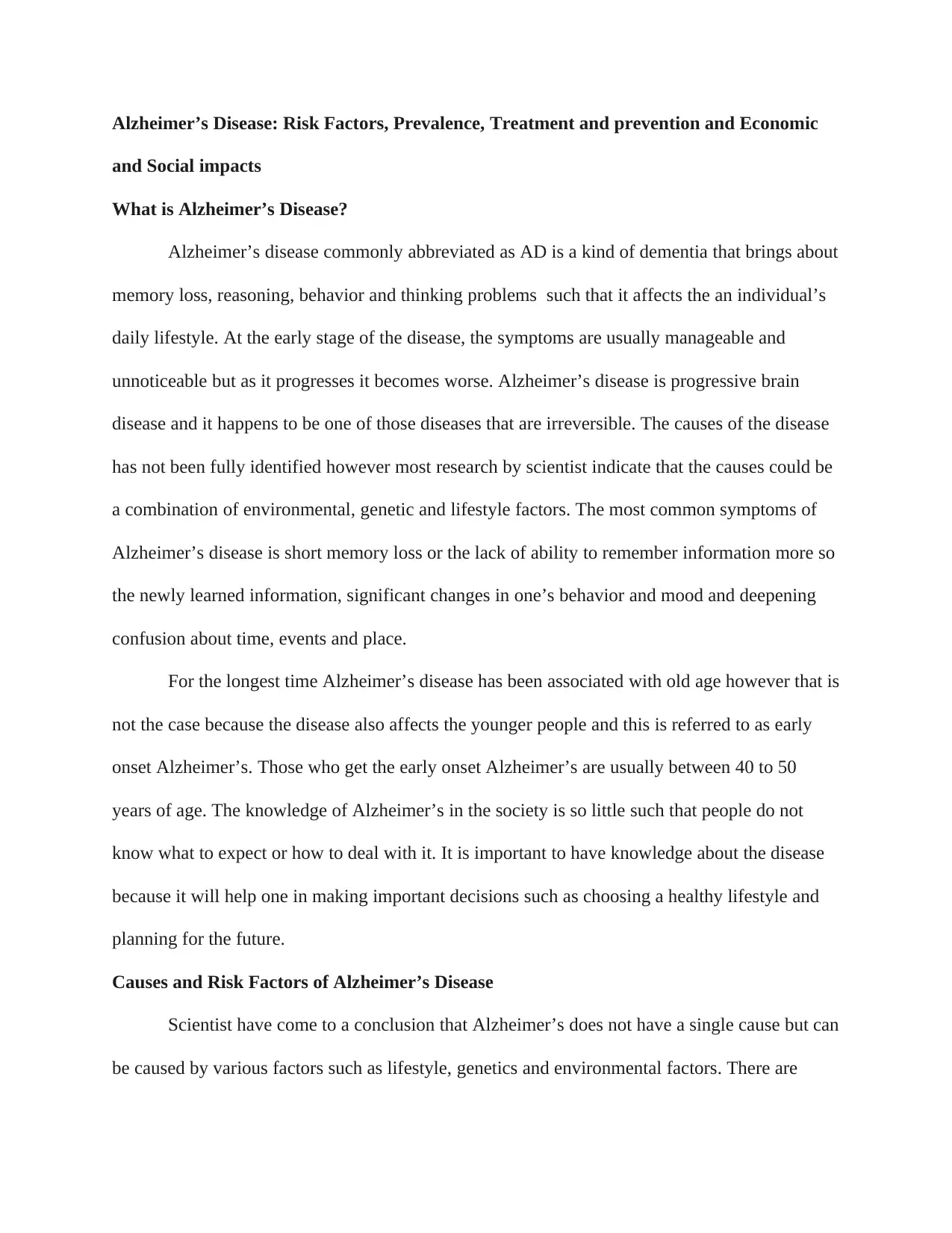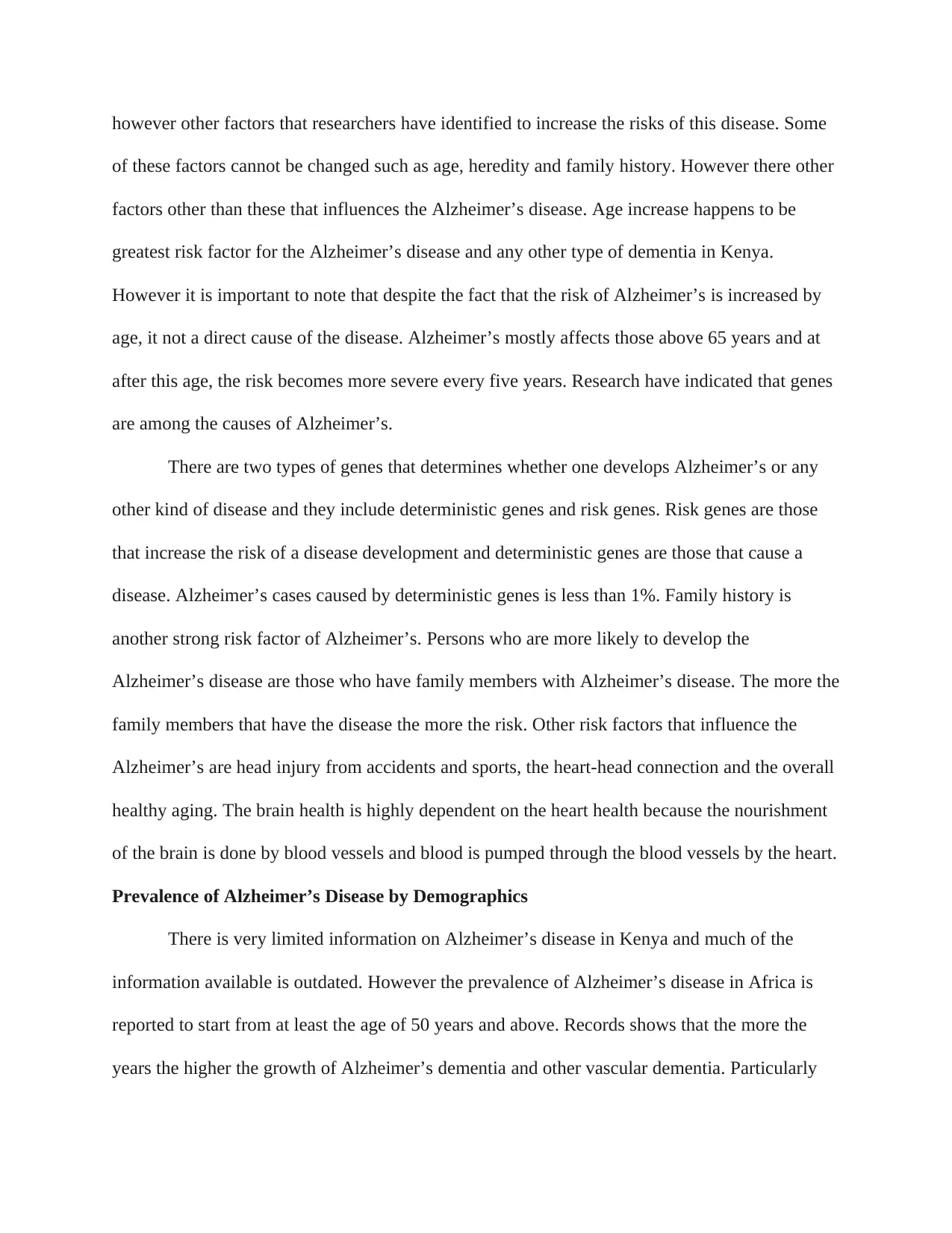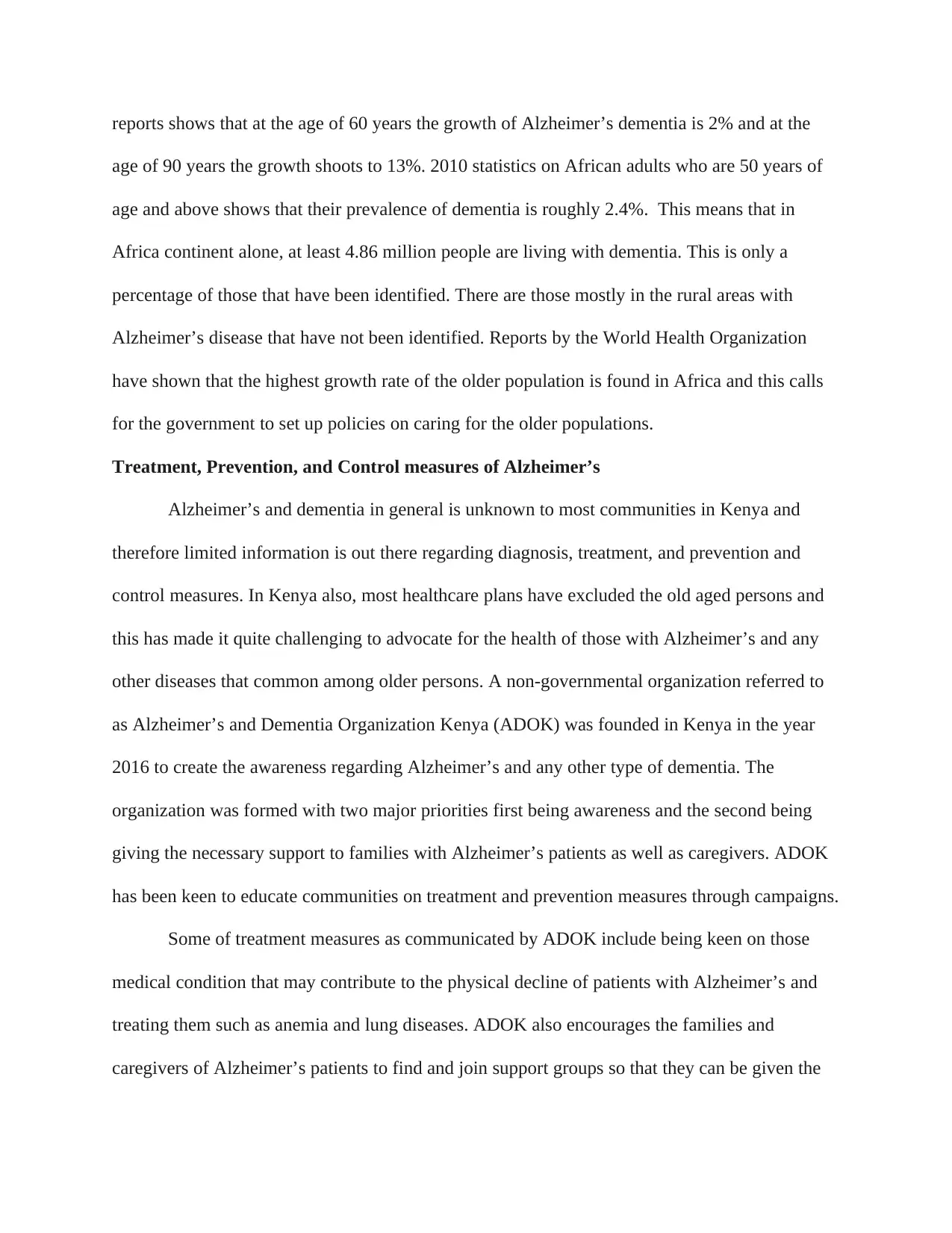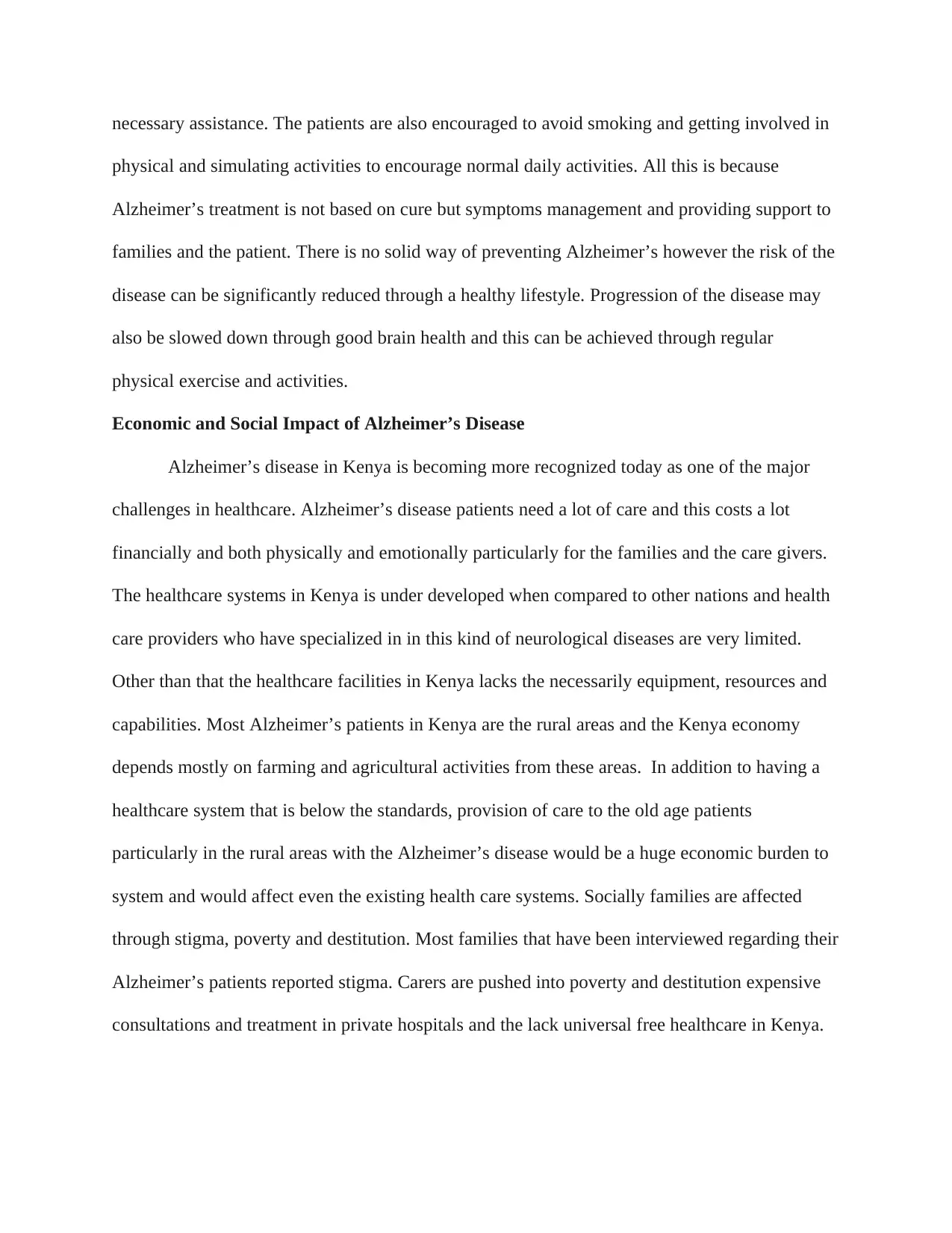Alzheimer's Disease: Risk, Prevalence, Treatment, and Impacts
VerifiedAdded on 2021/05/21
|4
|1441
|17
Report
AI Summary
This report provides a comprehensive overview of Alzheimer's disease, focusing on its various aspects within the context of Kenya. It begins by defining Alzheimer's disease, outlining its symptoms, and differentiating between early-onset and late-onset forms. The report then delves into the causes and risk factors, including age, genetics, family history, and other influences. It examines the prevalence of the disease, providing statistics and demographic data, particularly in Africa and Kenya. The report further explores treatment, prevention, and control measures, highlighting the role of organizations like Alzheimer's and Dementia Organization Kenya (ADOK) in raising awareness and providing support. Finally, it assesses the economic and social impacts of Alzheimer's disease, including the financial burden on families and the healthcare system, as well as the social consequences of stigma and limited resources. The report emphasizes the need for increased awareness, improved healthcare infrastructure, and supportive policies to address the challenges posed by Alzheimer's disease in Kenya.

Alzheimer’s Disease: Risk Factors, Prevalence, Treatment and prevention and Economic
and Social impacts
What is Alzheimer’s Disease?
Alzheimer’s disease commonly abbreviated as AD is a kind of dementia that brings about
memory loss, reasoning, behavior and thinking problems such that it affects the an individual’s
daily lifestyle. At the early stage of the disease, the symptoms are usually manageable and
unnoticeable but as it progresses it becomes worse. Alzheimer’s disease is progressive brain
disease and it happens to be one of those diseases that are irreversible. The causes of the disease
has not been fully identified however most research by scientist indicate that the causes could be
a combination of environmental, genetic and lifestyle factors. The most common symptoms of
Alzheimer’s disease is short memory loss or the lack of ability to remember information more so
the newly learned information, significant changes in one’s behavior and mood and deepening
confusion about time, events and place.
For the longest time Alzheimer’s disease has been associated with old age however that is
not the case because the disease also affects the younger people and this is referred to as early
onset Alzheimer’s. Those who get the early onset Alzheimer’s are usually between 40 to 50
years of age. The knowledge of Alzheimer’s in the society is so little such that people do not
know what to expect or how to deal with it. It is important to have knowledge about the disease
because it will help one in making important decisions such as choosing a healthy lifestyle and
planning for the future.
Causes and Risk Factors of Alzheimer’s Disease
Scientist have come to a conclusion that Alzheimer’s does not have a single cause but can
be caused by various factors such as lifestyle, genetics and environmental factors. There are
and Social impacts
What is Alzheimer’s Disease?
Alzheimer’s disease commonly abbreviated as AD is a kind of dementia that brings about
memory loss, reasoning, behavior and thinking problems such that it affects the an individual’s
daily lifestyle. At the early stage of the disease, the symptoms are usually manageable and
unnoticeable but as it progresses it becomes worse. Alzheimer’s disease is progressive brain
disease and it happens to be one of those diseases that are irreversible. The causes of the disease
has not been fully identified however most research by scientist indicate that the causes could be
a combination of environmental, genetic and lifestyle factors. The most common symptoms of
Alzheimer’s disease is short memory loss or the lack of ability to remember information more so
the newly learned information, significant changes in one’s behavior and mood and deepening
confusion about time, events and place.
For the longest time Alzheimer’s disease has been associated with old age however that is
not the case because the disease also affects the younger people and this is referred to as early
onset Alzheimer’s. Those who get the early onset Alzheimer’s are usually between 40 to 50
years of age. The knowledge of Alzheimer’s in the society is so little such that people do not
know what to expect or how to deal with it. It is important to have knowledge about the disease
because it will help one in making important decisions such as choosing a healthy lifestyle and
planning for the future.
Causes and Risk Factors of Alzheimer’s Disease
Scientist have come to a conclusion that Alzheimer’s does not have a single cause but can
be caused by various factors such as lifestyle, genetics and environmental factors. There are
Paraphrase This Document
Need a fresh take? Get an instant paraphrase of this document with our AI Paraphraser

however other factors that researchers have identified to increase the risks of this disease. Some
of these factors cannot be changed such as age, heredity and family history. However there other
factors other than these that influences the Alzheimer’s disease. Age increase happens to be
greatest risk factor for the Alzheimer’s disease and any other type of dementia in Kenya.
However it is important to note that despite the fact that the risk of Alzheimer’s is increased by
age, it not a direct cause of the disease. Alzheimer’s mostly affects those above 65 years and at
after this age, the risk becomes more severe every five years. Research have indicated that genes
are among the causes of Alzheimer’s.
There are two types of genes that determines whether one develops Alzheimer’s or any
other kind of disease and they include deterministic genes and risk genes. Risk genes are those
that increase the risk of a disease development and deterministic genes are those that cause a
disease. Alzheimer’s cases caused by deterministic genes is less than 1%. Family history is
another strong risk factor of Alzheimer’s. Persons who are more likely to develop the
Alzheimer’s disease are those who have family members with Alzheimer’s disease. The more the
family members that have the disease the more the risk. Other risk factors that influence the
Alzheimer’s are head injury from accidents and sports, the heart-head connection and the overall
healthy aging. The brain health is highly dependent on the heart health because the nourishment
of the brain is done by blood vessels and blood is pumped through the blood vessels by the heart.
Prevalence of Alzheimer’s Disease by Demographics
There is very limited information on Alzheimer’s disease in Kenya and much of the
information available is outdated. However the prevalence of Alzheimer’s disease in Africa is
reported to start from at least the age of 50 years and above. Records shows that the more the
years the higher the growth of Alzheimer’s dementia and other vascular dementia. Particularly
of these factors cannot be changed such as age, heredity and family history. However there other
factors other than these that influences the Alzheimer’s disease. Age increase happens to be
greatest risk factor for the Alzheimer’s disease and any other type of dementia in Kenya.
However it is important to note that despite the fact that the risk of Alzheimer’s is increased by
age, it not a direct cause of the disease. Alzheimer’s mostly affects those above 65 years and at
after this age, the risk becomes more severe every five years. Research have indicated that genes
are among the causes of Alzheimer’s.
There are two types of genes that determines whether one develops Alzheimer’s or any
other kind of disease and they include deterministic genes and risk genes. Risk genes are those
that increase the risk of a disease development and deterministic genes are those that cause a
disease. Alzheimer’s cases caused by deterministic genes is less than 1%. Family history is
another strong risk factor of Alzheimer’s. Persons who are more likely to develop the
Alzheimer’s disease are those who have family members with Alzheimer’s disease. The more the
family members that have the disease the more the risk. Other risk factors that influence the
Alzheimer’s are head injury from accidents and sports, the heart-head connection and the overall
healthy aging. The brain health is highly dependent on the heart health because the nourishment
of the brain is done by blood vessels and blood is pumped through the blood vessels by the heart.
Prevalence of Alzheimer’s Disease by Demographics
There is very limited information on Alzheimer’s disease in Kenya and much of the
information available is outdated. However the prevalence of Alzheimer’s disease in Africa is
reported to start from at least the age of 50 years and above. Records shows that the more the
years the higher the growth of Alzheimer’s dementia and other vascular dementia. Particularly

reports shows that at the age of 60 years the growth of Alzheimer’s dementia is 2% and at the
age of 90 years the growth shoots to 13%. 2010 statistics on African adults who are 50 years of
age and above shows that their prevalence of dementia is roughly 2.4%. This means that in
Africa continent alone, at least 4.86 million people are living with dementia. This is only a
percentage of those that have been identified. There are those mostly in the rural areas with
Alzheimer’s disease that have not been identified. Reports by the World Health Organization
have shown that the highest growth rate of the older population is found in Africa and this calls
for the government to set up policies on caring for the older populations.
Treatment, Prevention, and Control measures of Alzheimer’s
Alzheimer’s and dementia in general is unknown to most communities in Kenya and
therefore limited information is out there regarding diagnosis, treatment, and prevention and
control measures. In Kenya also, most healthcare plans have excluded the old aged persons and
this has made it quite challenging to advocate for the health of those with Alzheimer’s and any
other diseases that common among older persons. A non-governmental organization referred to
as Alzheimer’s and Dementia Organization Kenya (ADOK) was founded in Kenya in the year
2016 to create the awareness regarding Alzheimer’s and any other type of dementia. The
organization was formed with two major priorities first being awareness and the second being
giving the necessary support to families with Alzheimer’s patients as well as caregivers. ADOK
has been keen to educate communities on treatment and prevention measures through campaigns.
Some of treatment measures as communicated by ADOK include being keen on those
medical condition that may contribute to the physical decline of patients with Alzheimer’s and
treating them such as anemia and lung diseases. ADOK also encourages the families and
caregivers of Alzheimer’s patients to find and join support groups so that they can be given the
age of 90 years the growth shoots to 13%. 2010 statistics on African adults who are 50 years of
age and above shows that their prevalence of dementia is roughly 2.4%. This means that in
Africa continent alone, at least 4.86 million people are living with dementia. This is only a
percentage of those that have been identified. There are those mostly in the rural areas with
Alzheimer’s disease that have not been identified. Reports by the World Health Organization
have shown that the highest growth rate of the older population is found in Africa and this calls
for the government to set up policies on caring for the older populations.
Treatment, Prevention, and Control measures of Alzheimer’s
Alzheimer’s and dementia in general is unknown to most communities in Kenya and
therefore limited information is out there regarding diagnosis, treatment, and prevention and
control measures. In Kenya also, most healthcare plans have excluded the old aged persons and
this has made it quite challenging to advocate for the health of those with Alzheimer’s and any
other diseases that common among older persons. A non-governmental organization referred to
as Alzheimer’s and Dementia Organization Kenya (ADOK) was founded in Kenya in the year
2016 to create the awareness regarding Alzheimer’s and any other type of dementia. The
organization was formed with two major priorities first being awareness and the second being
giving the necessary support to families with Alzheimer’s patients as well as caregivers. ADOK
has been keen to educate communities on treatment and prevention measures through campaigns.
Some of treatment measures as communicated by ADOK include being keen on those
medical condition that may contribute to the physical decline of patients with Alzheimer’s and
treating them such as anemia and lung diseases. ADOK also encourages the families and
caregivers of Alzheimer’s patients to find and join support groups so that they can be given the
⊘ This is a preview!⊘
Do you want full access?
Subscribe today to unlock all pages.

Trusted by 1+ million students worldwide

necessary assistance. The patients are also encouraged to avoid smoking and getting involved in
physical and simulating activities to encourage normal daily activities. All this is because
Alzheimer’s treatment is not based on cure but symptoms management and providing support to
families and the patient. There is no solid way of preventing Alzheimer’s however the risk of the
disease can be significantly reduced through a healthy lifestyle. Progression of the disease may
also be slowed down through good brain health and this can be achieved through regular
physical exercise and activities.
Economic and Social Impact of Alzheimer’s Disease
Alzheimer’s disease in Kenya is becoming more recognized today as one of the major
challenges in healthcare. Alzheimer’s disease patients need a lot of care and this costs a lot
financially and both physically and emotionally particularly for the families and the care givers.
The healthcare systems in Kenya is under developed when compared to other nations and health
care providers who have specialized in in this kind of neurological diseases are very limited.
Other than that the healthcare facilities in Kenya lacks the necessarily equipment, resources and
capabilities. Most Alzheimer’s patients in Kenya are the rural areas and the Kenya economy
depends mostly on farming and agricultural activities from these areas. In addition to having a
healthcare system that is below the standards, provision of care to the old age patients
particularly in the rural areas with the Alzheimer’s disease would be a huge economic burden to
system and would affect even the existing health care systems. Socially families are affected
through stigma, poverty and destitution. Most families that have been interviewed regarding their
Alzheimer’s patients reported stigma. Carers are pushed into poverty and destitution expensive
consultations and treatment in private hospitals and the lack universal free healthcare in Kenya.
physical and simulating activities to encourage normal daily activities. All this is because
Alzheimer’s treatment is not based on cure but symptoms management and providing support to
families and the patient. There is no solid way of preventing Alzheimer’s however the risk of the
disease can be significantly reduced through a healthy lifestyle. Progression of the disease may
also be slowed down through good brain health and this can be achieved through regular
physical exercise and activities.
Economic and Social Impact of Alzheimer’s Disease
Alzheimer’s disease in Kenya is becoming more recognized today as one of the major
challenges in healthcare. Alzheimer’s disease patients need a lot of care and this costs a lot
financially and both physically and emotionally particularly for the families and the care givers.
The healthcare systems in Kenya is under developed when compared to other nations and health
care providers who have specialized in in this kind of neurological diseases are very limited.
Other than that the healthcare facilities in Kenya lacks the necessarily equipment, resources and
capabilities. Most Alzheimer’s patients in Kenya are the rural areas and the Kenya economy
depends mostly on farming and agricultural activities from these areas. In addition to having a
healthcare system that is below the standards, provision of care to the old age patients
particularly in the rural areas with the Alzheimer’s disease would be a huge economic burden to
system and would affect even the existing health care systems. Socially families are affected
through stigma, poverty and destitution. Most families that have been interviewed regarding their
Alzheimer’s patients reported stigma. Carers are pushed into poverty and destitution expensive
consultations and treatment in private hospitals and the lack universal free healthcare in Kenya.
1 out of 4
Related Documents
Your All-in-One AI-Powered Toolkit for Academic Success.
+13062052269
info@desklib.com
Available 24*7 on WhatsApp / Email
![[object Object]](/_next/static/media/star-bottom.7253800d.svg)
Unlock your academic potential
Copyright © 2020–2025 A2Z Services. All Rights Reserved. Developed and managed by ZUCOL.





